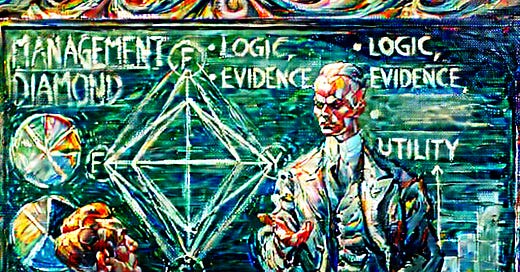GENCO MEMO-9-30-24: Two New Hormozi Frameworks I've Started Using
I recently came across a Youtube video with two Frameworks that simplify employee performance management and thinking and I've implemented in my work.
I’m always on the lookout for new frameworks and I found two good ones–in one place.
I’ve recommended previous videos by Alex Hormozi. He has great practical advice if you want to get ahead in business.
This video I found over the weekend surprised me with two very good frameworks that I have already started to use in my work with business clients.
These frameworks he shares are designed to help you not only manage your team more effectively but also approach problem-solving with greater clarity and precision.
So you know what to look for during the video, here are the two frameworks:
Management Diamond Framework: This framework helps identify why an employee may not be meeting expectations by breaking down the issue into five areas:
What (communication)
How (training)
When (deadlines)
Incentive (motivation)
Blockers (external obstacles).
Logic-Evidence-Utility Framework: This thinking framework helps you break down vague or misleading statements into actionable insights by asking three questions:
What does this mean? (Logic)
How do you know? (Evidence)
So what? (Utility).
What I liked about this particular concept is how it emphasizes the power of defining terms, relying on evidence, and understanding the practical implications of statements. This is something I do in class (and cross-examination), but I didn’t have a clear and consistent methodology to use. Now I do, and you do too.
Here’s the video. After, I’ll give a more detailed summary you can copy for your notes. He draws out the frameworks during the video which will help visualize and remember them.
Here’s my summary of the video:
1. Management Diamond Framework
I think of this as a practical framework for identifying and dealing with why employees might not be meeting expectations and it gives a structured way to manage these issues.
Hormozi breaks down the reasons an employee might fail to complete a task into five main categories:
What: The employee may not have known what was expected of them. This is a communication issue and can be fixed by clarifying and explaining instructions.
How: The employee may not know how to do the task. This can be fixed through training.
When: The employee may not have known the deadline. Assigning clear deadlines solves this problem.
Incentive: If the employee knows what, how, and when to complete the task but still doesn’t do it, they might lack motivation. This may require either external incentives or internal motivation.
Blockers: External obstacles might prevent the task from being completed, such as a lack of resources or logistical issues.
Hormozi explains in the video that he uses this framework to guide hard conversations with employees.
2. Logic-Evidence-Utility Framework
This framework is about clear thinking and breaking down statements or claims made by others–especially when the statements seem vague or unsubstantiated. Hormozi uses three key questions to deconstruct ideas and clarify them:
Logic: What does this mean? This step involves defining terms and concepts to understand the exact meaning behind a statement. Anybody who has been in my class knows I’m always pausing the lecture to have them look up the meaning of words on their phones or computers before we go on.
Evidence: How do you know? This question addresses whether the claim or statement is supported by actual proof or observable facts. It’s amazing how many people just repeat what others tell them or what they’ve heard without looking into what evidence actually supports the claim.
Utility: So what? This question asks what the practical implications of the statement are and whether it leads to any meaningful action. In other words, does it matter?
An example Hormozi uses in the video is breaking down the statement "I'm stressed because I'm lonely." By asking what "lonely" means and whether being lonely is truly the cause of stress, the situation becomes clearer, making it easier to address the root cause.
In both frameworks, Hormozi explains that his experience has taught him the need for clear, specific communication and focusing on observable actions rather than assumptions or vague ideas.
Try or adapt these for yourself like I already have.
That is all.
Have a good week.






